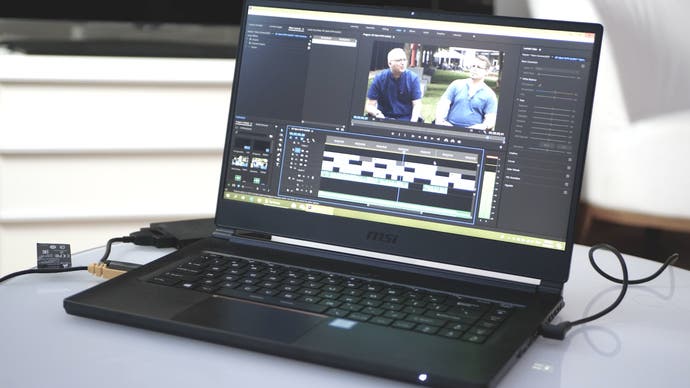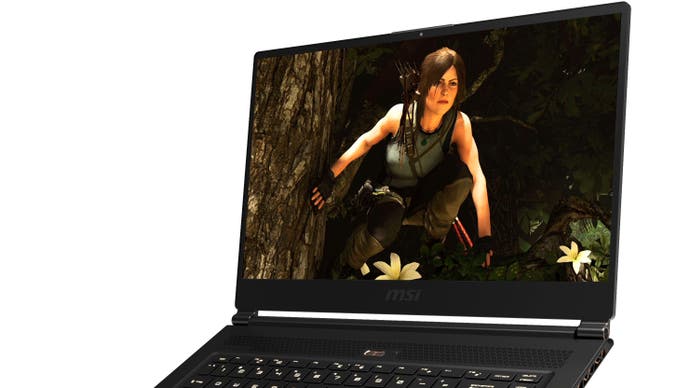MSI GS65 Stealth review: the ultimate all-in-one laptop?
Games machine, ultrabook... heavy duty 4K editing workstation?
Have we reached the point where high-end laptop technology has evolved to the point where one machine can cover the majority of potential use-case scenarios? Can the latest thin and light machines featuring six-core Intel processors and Nvidia's GTX 1070 Max-Q GPU replace your games machine and your ultrabook - while delivering enough CPU horsepower to work as a high-end 4K video editing workstation? In a multi-month experiment, we put MSI's GS65 Stealth laptop to the test, with some fascinating results.
The GS65 is one of a small range of notebooks recently released that deliver formidable CPU and GPU power in a form factor very similar to a 15-inch MacBook Pro. Effectively, these machines work by taking high-end desktop CPU and GPU processors and running them at reduced clocks - at frequencies tuned to deliver the sweet spot in terms of performance per watt (what Nvidia refers to as the Max Q point). The Core i7 8750H in the GS65 is architecturally identical to the Core i7 8700K from the desktop realm, simply running in a reduced power window. And it's the same with the GTX 1070 - though Nvidia's mobile part here actually has 128 more CUDA cores than its desktop counterpart.
These machines are typically delivered with 1080p, 144Hz 15-inch screens, while storage is taken care of with M.2 SSDs. This is crucial for productivity workloads and ease of use in Windows: NVMe SSDs use PCI Express connectivity for extreme bandwidth, every bit the equal of the best desktop drives... because they are the best desktop drives. All of the 8750H/1070 Max-Q notebooks feature two M.2 SSD slots on their mainboards, bar the new Razer Blade 15, which only has one.
To sum up then, at the hardware level, we have higher-end desktop grade parts with power tweaks paired with state of the art storage, high frequency displays and all crammed into a package that's just 17.9mm thick. This new breed of laptop also comes with high capacity batteries designed to offer eight hours of stamina in typical working tasks - there's an 80WHr capacity battery in the GS65, but the similar Gigabyte Aero 15X ramps this up to 94WHr. This aspect is also crucial to the testing; we've got the form factor here to replace an ultrabook but the extended battery life found in that kind of laptop also needs to be delivered here too.
So how did we go about testing the GS65's productivity credentials? Well, we chose 4K video editing using Adobe Premiere Pro and 4K video compression with Handbrake as our chosen stress tests because these are actually a real-life challenges Digital Foundry has faced at events like E3 and Gamescom. With compression, we source high quality 4K video capture (typically in ProRes format using an Atomos Ninja Inferno) as these 1gbps files need to be shrunk down with no perceptible loss of quality then transmitted back to base.
During E3 2017, we lashed up a mini ITX system with a Core i7 6700K running at stock clocks (but under-volted to avoid over-heating). It did the job, but portability was a problem - especially as there's no integrated screen or input devices. Clocks are lower on the MSI's Core i7 8750H, but an extra two cores and four threads delivers more performance than our old solution. In fact, the 8750H is around 10 per cent faster than a desktop Core i7 7700K. Put simply, this level of power in a notebook is fantastically liberating.

Better than last-gen desktop performance also translates into a nigh-on seamless video editing experience too. We've got a couple of real-life examples here to demonstrate what a game-changer this was for us. During E3 2018, John captured Forza Horizon 4 at the Microsoft booth, then put together this edit back at the hotel. Handling high bandwidth 4K60 ProRes video posed zero issues for the MSI machine.
Another, more taxing example is the discussion video embedded below concentrating on Nvidia's new RTX technology, shot outside our hotel at Gamescom. We used two Panasonic GH5 cameras to film the discussion at 4K60 resolution. The final video was 1080p, but the actual edit was based on those 4K streams - we can use portions of the image to zoom in on speakers with no visible loss of quality, or use the entire 4K image downscaled for wider shots of the three of us. What we end up with on the timeline is multiple 4K streams handled in parallel - a stern processing challenge and yet the experience was still very desktop-like, with full real-time playback on the timeline. Indeed, the biggest limitation here was the 1080p resolution of the screen, as opposed to the horsepower of the unit itself.
In the case of both edits, the 4K assets were stored on SSDs connected by USB 3.0 adapters, meaning that connectivity on the IO isn't limited either. While an SD card slot would have been useful, the MSI does have access to Thunderbolt over USB-C, meaning that there is access to very high bandwidth for storage if, for some reason, USB 3.0 isn't enough.
The bottom line? Across two trade events, the MSI GS65 Stealth proved more portable, more powerful and easier to use than our existing mini-ITX PC, delivering a desktop-grade experience. The CPU is quantifiably stronger than older desktop quad-core i7s and we have GTX 1070 graphics power too - and Adobe Premiere does use the GPU extensively for video effects rendering. The biggest niggles with the GS65 come down to acoustics and thermal management. The fans in the GS65 aren't loud but the pitch is grating and when editing, noise cancelling headphones make all the difference. There's also the sense that the CPU may be hitting thermal limits regardless, based on hardware monitoring during gaming.
And gaming is our next big challenge for this potential all-rounder. Benchmarks reveal that the Core i7 8750H is about ten per cent faster than a 7700K, but a non-power-limited 8700K outperforms it with around 25 to 30 per cent more horsepower. For gaming, the big question concerns the Max-Q graphics hardware - yes, we should expect reduced clocks compared to the desktop GTX 1070, but just how much slower is it?
MSI GS65 Stealth: Core i7 8750H/GTX 1070 Max-Q Analysis



